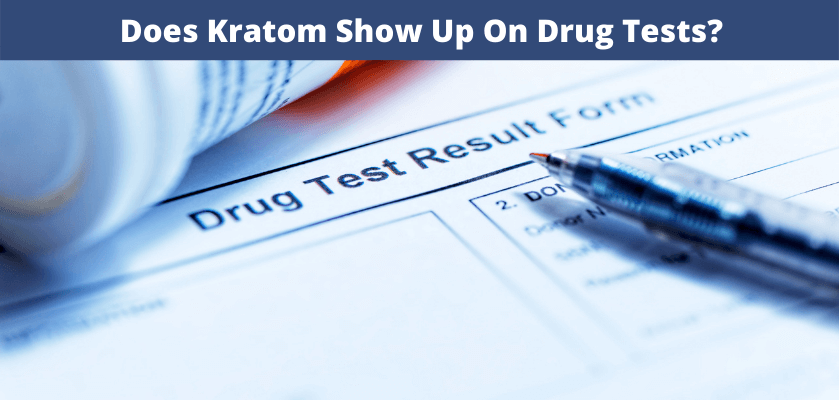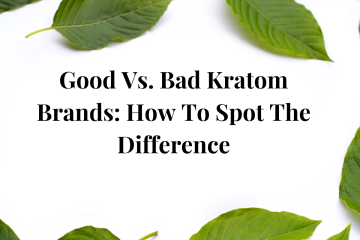The internet is full of myths, rumors, and false information about drug test and Kratom. As a result, people often struggle to find the right answer to whether or not Kratom shows up on a drug test.
Although Kratom is legal in most US states, some plants and herbal products can cause a false positive for Kratom on a drug test, which causes worry and makes people think about how to handle such a situation.
But you have nothing to worry about because we have got you covered. In this blog, we discuss everything you must know about Kratom and drug tests. So buckle up and read the full blog.
False Positives For Kratom In Drug Tests: What To Know?
When it comes to false positives for Kratom in drug tests, there are several important points to consider:
Kratom’s Composition
Kratom contains alkaloids like mitragynine and 7-hydroxy mitragynine, which are responsible for its effects. While these compounds are not generally included in standard drug panels, they could potentially cross-react with some drug tests, leading to false positives for other substances, such as opioids.
Cross-Reactivity
False positives might occur in some drug tests due to the cross-reactivity of kratom alkaloids or other substances. It is crucial to understand the drug testing methods and the chances for cross-reactivity with Kratom.
Quality and Purity of Kratom Products
The purity and quality of kratom products can vary significantly. Contamination with other substances, such as opioids or stimulants, could increase the risk of Kratom false positives on drug tests. It’s essential to obtain Kratom from reputable sources and ensure product purity through third-party testing whenever possible.
Individual Factors
The way in which the body processes and eliminates substances can be influenced by various individual factors like metabolism, hydration levels, and underlying health conditions. As a result, there may be differences in drug test results among different individuals, which can be attributed to these factors.
Confirmatory Testing
Suppose a drug test produces a positive result for Kratom or other substances. In that case, confirmatory testing using more specific methods, such as gas chromatography-mass spectrometry (GC-MS) or liquid chromatography-mass spectrometry (LC-MS), can help confirm or refute the initial findings. Confirmatory testing is essential for accurately identifying the presence of specific substances and ruling out false positives.
Overall, while false positives for Kratom on drug tests are possible, they are relatively rare when appropriate testing methods are used. By understanding the factors that can influence drug test results and maintaining open communication with relevant parties, individuals can navigate drug testing procedures effectively and minimize the risk of false positives.
Similarly, the answer to “Will kratom show up in a drug test?” also depends on numerous variables and types of drug tests. Let’s get into it.
Drug Tests that Detect Kratom
Currently, the most common drug testing methods—saliva tests, 5-panel tests, blood tests, and hair follicle tests are not typically used to detect Kratom or its alkaloids/metabolites, but that doesn’t mean that Kratom won’t show up or have a false positive. Generally, these tests are used to detect illegal substances.
The most common drugs screened for in drug tests include:
- THC (marijuana)
- Opiates (heroin, opium, morphine, codeine)
- Phencyclidine (PCP)
- Amphetamines
- Cocaine
Tests may also screen for the following drugs:
- Barbiturates
- Benzodiazepines
- Methadone
- LSD
- Steroids
- MDMA (Ecstasy)
That being said, if you live in a state where Kratom is illegal, any of these tests could be used to detect Kratom in trace amounts. Typically, for Kratom to show up on a drug test, it must be specifically tested for. Let’s take a closer look at some of the drug tests that may detect Kratom.
Does Kratom show up in urine test?
Urine testing is one of the most common drug tests in the US due to its convenience and relative affordability. While Kratom is not typically included in standard drug panels, some specialized tests may detect its presence. If you have concerns about Kratom showing up on a drug test, it’s essential to discuss this with the entity administering the test and be transparent about your kratom use.
Does Kratom show up on a 12 panel drug test?
A standard 12-panel drug test typically does not include Kratom. However, if there are specific concerns about kratom use, it’s essential to communicate this with the entity conducting the test, as they may opt for additional testing specifically for Kratom.
A 12-panel drug test is a comprehensive screening method that detects the presence of twelve different substances in a person’s system. These substances typically include:
- Marijuana (THC)
- Cocaine
- Opiates (such as heroin, morphine, and codeine)
- Amphetamines (including methamphetamine)
- Methadone
- Benzodiazepines (such as Valium and Xanax)
- Barbiturates
- Methaqualone
- Propoxyphene
- MDMA (Ecstasy)
- Tricyclic antidepressants
- Synthetic cannabinoids
Some doctors might automatically include Kratom in their specialized 12-panel drug tests, but it’s not always the case. Kratom’s alkaloids may be detected in 12-panel drug tests, but they shouldn’t typically give a false positive reading for opiate-like codeine.
Liquid Chromatography
In 2010, a study looked at a relatively new form of kratom detection—Liquid chromatography (tandem mass spectrometry). This kratom detection method is a form of solid-phase extraction testing, which utilizes chromatography-UV testing to uncover the presence of mitragynine, one of Kratom’s alkaloids.
Mass spectrometry has been used to test for different alkaloids of Kratom, of which there are over 40. Although it had limits, the study found this kratom testing method to be “accurate and precise for the quantitative analysis of mitragynine in human and rat plasma.” Variations in the detection of orally administered Kratom were said to be due to poor bioavailability.
If there were ever a federal kratom ban in the US, it’s more likely that places would use a liquid chromatography test to detect Kratom. Currently, it’s unlikely that you will encounter this test for Kratom unless you’re participating in a research trial (although clinical kratom studies are rare), or you’re being toxicology tested.
In general, research from clinical studies on the pharmacokinetics of Kratom in humans is severely lacking, and animal data from other kratom studies cannot be directly applied to humans.
Will Kratom make you fail a drug test? The Risk of Adulterated Kratom Products
Although natural Mitragyna speciosa may be able to trigger a false positive for methadone or other opiates on a drug test, there is also a risk that contaminated or adulterated Kratom could make you fail a drug test. If the Kratom you’re buying has been exposed to other drugs, or even worse—tampered with intentionally by an illegitimate vendor—you could get flagged for that drug.
Because the FDA does not regulate Kratom (or approve of Kratom for any use), the quality of Kratom products can vary from vendor to vendor. Ideally, if you want to buy Kratom, look for reputable vendors who lab-test their products and share them with the public. This is the best way to know what’s in the Kratom you’re buying, including its alkaloid content.
Otherwise, if you buy Kratom from a headshop, gas station, or another place that doesn’t commit to certain quality control standards—you could be buying contaminated or adulterated Kratom.
Does Kratom show up on a probation drug test?
The responses are varied, especially in different posts. Some say that their probation officers test for Kratom. Others say that Kratom didn’t show up on a drug probation test. More concerningly, some people have wondered if they’ve purchased contaminated Kratom after getting a positive result for a drug that isn’t typically a false positive for Kratom.
The Bottom Line
If you live in a state where Kratom is legal, and your doctor hasn’t advised you to avoid Kratom, you don’t need to worry much about Kratom and drug tests. Kratom can sometimes cause a false positive for urine or other drug tests, like many other substances.
If you find yourself in a situation where you may have used Kratom, it’s important to stay calm and be truthful about it. To avoid the risk of buying Kratom that has been mixed with other substances, it’s best to stay away from brands sold in headshops. Instead, look for Kratom vendors who follow proper manufacturing standards and legal marketing requirements, conduct lab tests, and are transparent with their customers.
Shop Pure and adulteration-free Kratom From BKB
If you want to buy high-quality and pure Kratom, you must try Buy Kratom Bulk USA. We ensure that every batch of our Kratom products undergoes extensive third-party lab testing to ensure its purity and potency. Our customers can rest assured knowing that the product they receive is free from contaminants and meets the highest quality standards.
Moreover, we are committed to offering competitive prices without compromising on quality. When you purchase kratom powders or Kratom capsules from BKB, you can rest assured that you are getting the finest quality product available.




